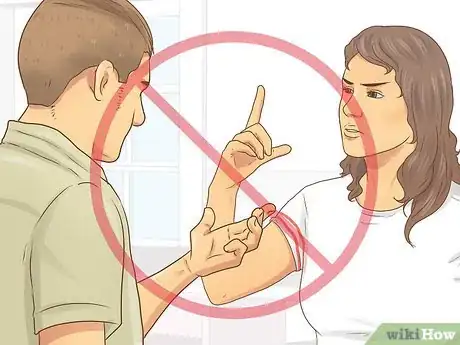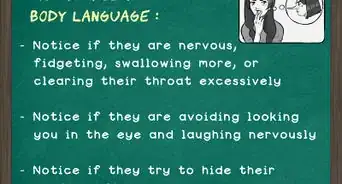This article was co-authored by Mary Church, PhD. Dr. Mary Church is a Licensed Clinical Psychologist based in Honolulu, Hawaii. With over a decade of clinical experience, she aims to integrate evolution, genetics, and neuroscience within the practice of psychotherapy. Dr. Church holds a BS in Psychology from Eckerd College and an MS and PhD in Experimental Psychology from The University of Memphis. She completed a Post-Doctorate in Clinical Psychology at The University of Hawaii at Manoa. In addition, Dr. Church is a member of the American Evaluation Association and Hawaii-Pacific Evaluation Association.
There are 13 references cited in this article, which can be found at the bottom of the page.
This article has been viewed 121,051 times.
People disagree about meaningful and trivial matters on a daily basis. Sometimes you know if you speak your mind you will upset someone. However, you often must express your opinion even if you know others will disagree. By choosing your words carefully you can avoid a long-term offense.
Steps
Being Honest in General
-
1Ask people about their perspective. Before being honest about how you feel its important to know their perspective. This gives you a chance to show genuine interest and have a conversation. This may also give you opportunities to speak up and be honest.[1] They may even end their explanation with a request to hear your perspective.
-
2Put yourself in their shoes. One of the simplest ways to avoid hurting feelings is to imagine how they will respond to your statements. If they said that to you, would you be upset? Practice imagining how they view their own opinion and yours. Just because their perspective is different doesn't mean its wrong.[2]Advertisement
-
3Control your words and body language. Be careful with your honesty. You want to speak the truth in kindness. That means avoiding overtly disapproving behaviors such as grimacing or making fun of their ideas.[3]
- Sometimes you may not know your tone of voice is broadcasting disapproval. This can be difficult to change. Your vocal tone is often subconsciously created. Try to speak in a neutral tone resisting the urge to let your feelings and emotions show true in your voice. You may think this disingenuous but once you speak your opinion, its not necessary to convey disapproval non-verbally too.
-
4Be polite in your responses. Whenever you try to avoid hurting others it is best to speak with kindness.[4] Common gestures of kindness (i.e., politeness) go a long way. They convey respect and show you value the other person. This situation isn't all about you speaking your mind. Its about them feeling valued.
-
5Express your perspective as opinion, not fact. Even if you know the facts back you up, this shows you value their perspective. If they have an open mind, facts will change their perspective. If they do not have an open mind, facts will feel like personal attacks. They have a right to be incorrect. Let them come to the truth on their own terms, not yours. Forcing your perspective is an easy way to hurt feelings.
- Don't criticize or condemn.[5] This may seem difficult but is important. Speak your truth in a way that doesn't put their perspective down. Statements like "You're wrong there" and "I can't believe you think that" are to be avoided. Instead, agree with them when their perspective is consistent with their justifications (e.g., "I can see how that follows"). Follow with your perspective (e.g., "I read that..." or "I think...") such that your statement is not directly antagonistic towards theirs.
- Avoid hyperbole. Very, very rarely are things "always" and "never." Avoid words and idioms that exaggerate the truth. Your goal is to be honest and hyperbole rarely is honest. Instead, use facts and try to avoid letting your emotions run high.
-
6Don't take the disagreement personally. Keep in mind being honest is not the same as being right. You can be honest and factually wrong at the same time. You can also be honest, factually right, and still hurt feelings. Be humble with your perspective. Listen to others' justifications for their perspectives and resist the urge to convert them to your perspective.[6]
- Place value in your own perspective.[7] You are entitled to your perspective and opinion. Even if you chose to be quiet, remember your perspective is just as valid as theirs. Just as they have a right to be honest, so do you.
- Just as you have a right to your opinion, they have a right to theirs. Even if their opinion is factually wrong or inconsistent with their own beliefs. If you speak your honest perspective and they do not hear you, forcing the issue will lead to hurt feelings. They aren't ready for it. If they disagree with you, that's ok. Resist the temptation to get them to agree with you.
- If it is important, you may have to let them make their own mistakes. But that doesn't mean you are wrong either when they vehemently disagree with you. This also doesn't mean they don't care about you. It just means they have a different perspective.
Expressing a Difference of Opinion
-
1Decide if you need to say anything at all. Sometimes being honest means being silent. You may find an honest expression of your desire for peace (i.e., remaining silent) outweighs the desire to speak your mind.[8]
- People feel compelled to express their strong opinions. Sometimes people do so to provoke a debate or change someone else's mind. This usually leads to a confrontation and unavoidable hurt feelings.
-
2Begin a discussion with an sincere invitation to listen to their opinion.[9] They may give you the whole story or they may express they do not want to discuss it. Pay attention to their reaction and what they say. This will help you gauge how they will receive even your honest opinion.
- If they decide not to discuss the issue, honor their wish. Perhaps it is the wrong time or place. Try asking again later. If they repeatedly rebuff you, you may need to express your opinion unsolicited or avoid it altogether.
-
3Identify the source of the difference of opinion. Try to understand what your opinion is based on. Then try to understand what their opinion is based on. Some disagreements are based on fundamental political, religious, and moral beliefs. Knowing those bases you can be respectful of the opinion and avoid hurt feelings.[10]
-
4Wait for them to either ask your opinion or finish giving theirs. Be patient, kind, and attentive throughout their story. This shows you respect them and are genuinely interested in them.
-
5Discuss your perspective as a matter of opinion. If you want to avoid hurting feelings, you must allow for the possibility that they are right and you are wrong. You can say "I've thought that..." instead of "You are wrong."
-
6Pay attention to verbal and bodily cues.[11] If the discussion is turning heated, stop. Chances are that you are about to hurt their feelings if you haven't already. Let them know you respect and value them.
- Apologize if you accidentally said something that hurt their feelings.[12] [13] Apologies are a signal that your respect the other person.Doing this early you can move on easily. Wait too late and the hurt may take much longer to repair.
- Do not overuse apologies. Saying "I'm sorry" too much--especially when you did nothing wrong--can lower the value of an apology. The goal is to identify when you've done something wrong and be sincere about your apology.
-
7Thank them for sharing and listening. This gives you an opportunity to end the difference of opinion on a positive note. Be sure to comment that you understand where they are coming from and hope they understand your perspective too.
Turning Down an Invitation
-
1Delay your response. Avoid responding immediately to a request you believe you will turn down. A quick "No" will rob you of time to formulate a kind decline. A simple "Let me check my calendar and get back to you" will often work. This gives you time to create a response in your head.
-
2Check your calendar for conflicts. If you are lucky you will have a scheduling conflict. You can honestly decline due to the conflict. If the conflict is the only reason for declining, let them know so that they will know to include you later.[14]
- If the person is persistent, they may ask you for a better time. Be prepared to respond with a more direct decline. When you see your calendar is busy, take a little extra time in advance to think about a kind decline if they ask for a better time.
-
3Avoid admitting your schedule is open. This is like saying you are free for anything a manipulative person is waiting to ask of you. Some people will ask about your schedule before making an offer or request. This way you have little excuse to turn them down without being mean. More importantly, you sacrifice the "Let me check my calendar" time to formulate a polite decline.
- If someone starts asking about your schedule, you can simply reply, "I don't know, why do you ask?" and remain polite. This is a good practice even if you intend to accept.
-
4Identify exactly why you want to decline. If you know you want to decline before checking your calendar you have a reason in mind. Do you dislike the task? Were you planning to go to that event with someone else? Think about reasons you can decline that focus on aspects of the offer or request and not aspects of the person offering or requesting.
-
5Decide if you would accept under different circumstances. Once you know exactly why you are declining you'll be able to imagine how circumstances might be different. Maybe if they asked you to do something different or offered more money. Keep these in mind if the other party asks why you are declining.[15]
- Be cautious about reasons for declining a request. If it is obvious that the exhaustive answer would hurt their feelings consider a vague response. If necessary, you may be able to get by with "I'd rather not say."
-
6Remember to respond. You may have made up your mind already but you must turn down a request to be polite. Ignoring the request may hurt their feelings or put you on a list of "have not replied." If you do not respond, they may assume you feel they are not important. Reply to requests promptly. Emphasize non-personal reasons for declining. Avoid disparaging the offer or person making the request or offer.
-
7Thank them for including you. Consider how fortunate you are that the other person values you. They may be disappointed but not hurt. Be polite and you can decline their offer or request without long-term hurt feelings.[16]
Assessing Someone's Appearance
-
1Smile genuinely to show appreciation.[17] If someone is asking for your opinion it means they value you. Use that knowledge to produce a genuine smile. This will make the sting of disapproval seem less personal.
-
2Ask them what they like about the outfit or style. This gives you an opportunity to hear their point of view. It also gives you time to carefully word your comments. This will also give you a measurement of how much they like, or dislike the outfit or style. They may even discuss their own reservations.
-
3Focus on the outfit or style rather than the person. Assume that the person under the outfit is beautiful. The outfit or style is just hiding that fact. Try to critique the outfit or style apart from any negative characteristics of the person.
- Appeal to any mutually-agreed-upon standard of dress to back up your opinion if you can. For example, use business dress standards if a new haircut, tattoo, or nail polish could cause them trouble at work. Use goodness of fit to highlight how the outfit would look better if it were better tailored.
-
4Avoid agreeing with a negative self-image. Expressing any disagreement may prompt self-deprecating statements (e.g., "I'm just too fat for this outfit..."). Do not agree with them. Even if you believe they are correct, some things do not need to be said. Be honest with yourself--you aren't trying to hurt their feelings, right?
- In situations like this, you might want to disagree outright with the negative statement. "You aren't fat, this dress just fails to highlight how beautiful you are."
- Unfortunately, if you fail to disagree with a negative statement the speaker may take that as an admission of your agreement. Be quick to disagree when you know this to be true.
-
5Discuss how other styles or outfits work better as alternatives. This allows you to be productive in two ways. First you offer alternatives for them to try. Second it provides avenues for you to shower them with complements. This shows them you value them in spite of the negative feedback you just offered.
- At this stage, always be sure to include references to their positive characteristics. Although you avoided referencing personal characteristics before, highlight positive aspects now.
References
- ↑ Mary Church, PhD. Research & Clinical Psychologist. Expert Interview. 6 August 2021.
- ↑ https://www.nytimes.com/guides/year-of-living-better/how-to-be-more-empathetic
- ↑ https://www.psychologytoday.com/blog/subliminal/201205/how-we-communicate-through-body-language
- ↑ Mary Church, PhD. Research & Clinical Psychologist. Expert Interview. 6 August 2021.
- ↑ Carnegie, D, (1936), "How to Win Friends and Influence People",ISBN 1439167346
- ↑ https://www.psychologytoday.com/us/blog/how-be-yourself/202011/6-ways-not-take-things-personally
- ↑ Rosenberg, M., (1986), "Conceiving the Self", ISBN 0898749611
- ↑ Carnegie, D, (1936), "How to Win Friends and Influence People",ISBN 1439167346
- ↑ Carnegie, D, (1936), "How to Win Friends and Influence People",ISBN 1439167346
- ↑ https://www.memphis.edu/ess/module3/page7.php
- ↑ http://www.entrepreneur.com/article/201202
- ↑ http://www.un.org/en/ombudsman/apologies.shtml
- ↑ Carnegie, D, (1936), "How to Win Friends and Influence People",ISBN 1439167346
- ↑ https://psychcentral.com/lib/learning-to-say-no
- ↑ https://www.grammarly.com/blog/saying-no/
- ↑ https://psychcentral.com/lib/learning-to-say-no#how-to-say-it
- ↑ http://phys.org/news/2011-05-researchers-measure-the-value-of.html
About This Article
If you want to be honest with someone without hurting their feelings, it’s important to express your perspective as opinion instead of a fact. The best way to do this is by framing your opinion as an “I” statement rather than a “you” statement. Even if the facts back you up, remember that the other person has the right to be wrong, and if they don't have an open mind, facts will feel like a personal attack. Avoid criticizing them, and instead agree with their perspective by saying “I can understand your thought process”. This is important because it will let you speak your truth while not putting them down. When you hear their thoughts on something, follow up with your perspective by starting with “I read that…” or “I think…” so you don’t seem antagonistic. For more advice from our Counselor co-author, including how to be honest about someone’s appearance, read on!






















































































